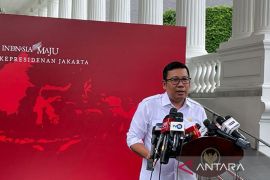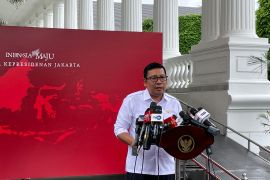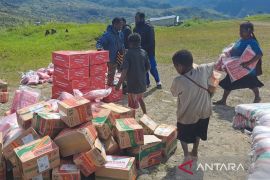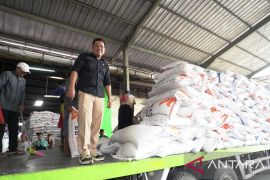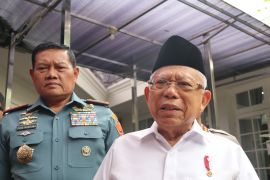Therefore, Indonesian Farmers Federation Chairman Henry Saragih urged the government here on Tuesday to play a role in strengthening food distribution to control fluctuating prices.
"Weak role of the government in the system of food distribution will cause price fluctuations of some strategic commodities," Henry Saragih said.
He said the fluctuations would follow the market mechanism which has a potential of scarcity of several commodities at certain times such as in Ramadhan fasting month and Lebaran festivity.
According to him, it would trouble most of the members of the community, especially the low-income group who averagely spent around 73 percent of their income on food commodities.
Henry also deplored the State Logistics Agency (Bulog) which, in his opinion, no longer played a role in controlling the national food availability.
"Since the beginning of its establishment, Bulog is one of the implementing instruments of national food policy but its role continues to experience ups and downs and its function continues to be restricted," Henry said.
He added that the restricted function of Bulog has been seen since the agreement of the Letter of Intent (LoI) with International Monetary Funds (IMF) in 1998 which gave a wider opportunity to private institutions to import rice.
According to him, the wider opportunity for the private parties to import rice has made food distribution getting weaker, especially following the increasing integration of national food trade with international markets.
Therefore Henry said the Indonesian Farmers Federation wanted the government to immediately a long term policy which could effectively suppress the rate of increase in rice prices and other basic commodities.
Meanwhile, chairman of House of Representatives` Commission-VI, Airlangga Hartarto suggested that the government buy the rice from local farmers instead of importing it to meet the national rice stocks.
Airlangga said the government has imported almost 2 million tons of rice in the first semester of this year.
But how can they be distributed properly to reach to low-income people in the remote areas?
East Java Governor Soekarwo said in Surabya early this month that the local government has set aside a total of Rp12.5 billion of funds to subsidize food distribution cost.
"It is one of government interventions to address the rising prices of basic needs at this time," the governor said, adding that the funds would be used to cover transportation cost from the distributors to marketplaces, to bypass the distribution channels so that the price of staples can be suppressed.
Governor Soekarwo said the funds, allocated from East Java Regional Budget 2011 were used three days in the run up to fasting month and three days before Lebaran festivity.
He said that a few days before the start of fasting month, the price of medium-grade rice prices rose from Rp6,500 to Rp7,300 per kilogram.
According to him, the rice price hikes were triggered by high purchasing power and high consumption quality.
"Therefore an attempt to suppress the rising prices of rice and other basic commodities is by subsidizing the transportation cost of food distribution from the distributors to marketplaces," Soekarwo said.
A decisive component of food distribution that has to be considered is transportation facility such as roads, vehicles, railway transport, airports, and seaports.
But Abdul Hamid Yusra, a lectures of agriculture faculty at the University of Tanjungpura in Pontianak, West Kalimantan, said recently that food distribution to the areas in the province was still constrained by the lack of infrastructure.
"To facilitate food distribution to remote areas in West Kalimantan, the government should repair the broken infrastructure in the province," Abdul Hamid said.
According to him, the method of distributing or transporting food and other logistics from one place to another was a very important factor in public nutrition because when it broke down, famine, malnutrition, and illness could occur.
"The damage of road infrastructure does not only hamper food distribution to remote areas but also complicate the marketing of agricultural produces from rural to urban areas," he said.
Abudul Hamid then expressed hope that the government would improve its management system as soon as possible from the food distribution to the farmers training in the management of their crops.
Meanwhile, West Kalimantan Food Resilience and Agricultural Extension Agency spokesman Bontor Panggabean said in Pontianak that his side would continue to optimize the smooth distribution of food to all people in remote areas.
"One of which is to continue to increase the minimum service standard in food distribution and food access to all districts/cities in West Kalimantan," Panggabean said.
In an effort to provide food distribution and food access to marginalized people, the Indonesian Farmers Federation chairman has proposed the establishment of food affairs ministry.
"To coordinate decisions on food production and distribution in Indonesia, a food affairs ministry should soon be established," Henry Saragih said here on Wednesday.
He said the establishment of food affairs ministry must also be intended to pay special attention to the poor in all parts of the country as well to those who have no access to food.
Besides, Henry Saragih added that the government should revive the central role of state logistic agency, Bulog, in accommodating and distributing food production.
The farmers federation also urged the government to revitalize rural cooperatives to manage the marketing of farm products.
"Give farmers organizations a bigger role in planning and realizing activities related to the distribution and marketing of farm products," he said. (*)
Reporter: Otniel Tamindael
Editor: Otniel Tamindael
Copyright © ANTARA 2011

